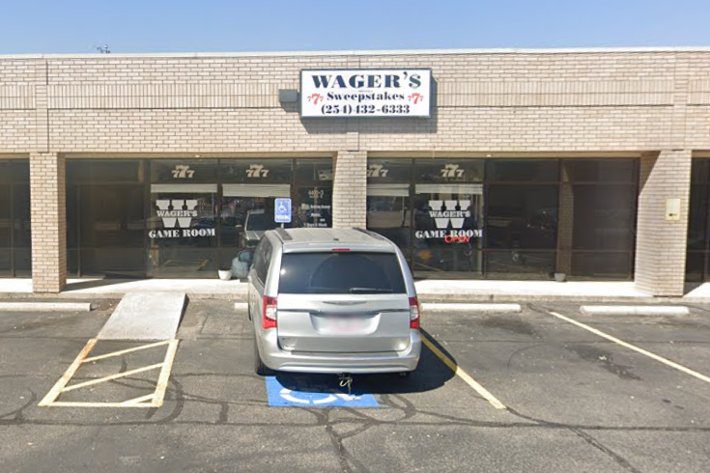Internet Sweepstake cafes (aka Sweepstakes Parlors) have been popping up in towns all over America and they can easily be mistaken for slot lounges, but what actually are they? Set up primarily in strip malls, and often nestled between insurance sellers and vape stores, they offer a form of grey area gaming even in states that don’t allow gambling.
How they do this, without turning into Meemaw’s backroom gambling room from Young Sheldon, all comes down to loopholes.
How Do They Work?

Unlike a traditional slot machine, players do not directly deposit money into the slot… sorry, sweepstakes machine. Instead, players purchase “internet time”, which gives them free entries into the sweepstakes games, or sweepstakes points, depending on the cafe.
There is normally a variety of games to choose from, with different games requiring a different number of entries or points. Players play the games to reveal whether or not they have won a prize. Because the result of the game is based on the result of a sweepstake rather than an individual RNG, you can even opt out of the games and have the computer simply reveal whether or not you have won a prize.
Confused? Think of it like renting time on a slot machine where some machines have been selected to win (via a sweepstakes). If yours is one of the lucky machines, then the sweepstake prize is yours. But at no point have you technically gambled any money on the machine itself.
Legal Loopholes to the Rescue
The most important difference between playing at an Internet Sweepstakes Cafe and a Casino is that there is no skill required, and it is not classified as a game of chance. Your skill at poker will not affect whether or not you get a prize. And unlike slot machines, there is no chance.
Whilst slot machines are set to pay out a certain percentage of the money they make, with no restrictions on how much, or how often, Internet Sweepstakes Cafes have sweepstakes periods where there is a predetermined number of prizes for predetermined amounts. When all the prizes have been won in a specific period, a new sweepstakes period begins.
This is a point of much controversy, as many people believe it is still a form gambling just once that’s been disguised as a sweepstake. The cafe owners counter with the fact that sweepstakes are offered in stores, workplaces, and restaurants all the time and are perfectly legal. Lawmakers have found it difficult to ban the cafes without also having to ban other forms of sweepstakes, which explains why this loophole is one that they haven’t yet managed to close.
Are They a Scam? Lack of Regulation Suggests You Should Proceed With Caution
Internet Sweepstakes Cafes deliberately skirt the banning of gambling in certain states, but that in itself doesn’t make it a scam. One legitimate concern players could have is that the games are not regulated, and there have been instances where obscure rules or out of just plain greed winners were not paid out their full winnings. And if you lose, there’s not a lot you can do.
What About Online Sweepstakes Casinos?

Sweepstakes cafes have been around since ~2010 or so but in recent years they’ve started to move online, albeit with a slightly different nomenclature – referred to as a “Sweepstake Casino” or sometimes “Social Casino”.
In addition to a different name, the online version also use a different set of mechanics to skirt around anti-gambling laws. Despite the difference in MO, the underlying loopholes and legality appear to be very similar.
This is where things do start to get a little confusing, but bear with us. In a sweepstakes cafe you receive a set of free sweepstake tickets with a qualifying purchase, such as paying for time to play on the machines. The result of these tickets is predetermined, meaning you don’t actually have to play the games if you don’t want to.
With the the online version, everything all revolves around virtual coins which you receive for free – normally for performing specific actions such as logging in, watching adverts or engaging with the casino’s social media. These coins can be used to play slot games which act like a more traditional slot. Additional coins can also be purchased with real money.
The virtual coins don’t have a value, but the winnings from your slot play can be exchanged for prizes. These prizes often include gift cards and cash prizes, effectively giving the player a way of “cashing out”.
Isn’t That Just Gambling?
Hang on a minute, we hear you say, that’s gambling. This is where things get a little murky and where the loopholes are having to work extra hard. From an outsiders perspective a player is able to buy coins with real money, play games and then turn their winnings into cash prizes. Meaning real money in and real money out. Which is gambling.
Technically though, it isn’t. The coins can be received for free or with a qualifying purchase, so the casinos argue that they fall under the sweepstakes umbrella. They’ve also done some clever footwork with the way the slots operate and classify each spin as an individual sweepstakes rather than a game of chance.
This is from the terms and conditions of the Pulsz site:
1.3 The Sweepstakes Period (“Sweepstakes Period”) for each Sweepstakes starts at the beginning of each spin and ends at the conclusion of that spin. Each spin is a separate Sweepstakes.
Effectively, their counter argument to the gambling claim is that you are, in fact, receiving free entries into a mini sweepstakes to win a prize. Ergo, not gambling. And technically they’re correct.
For now, at least.